最新人教版高中英语必修一Unit1语法知识
人教版高中英语必修一UNIT1语法课件(共38张)
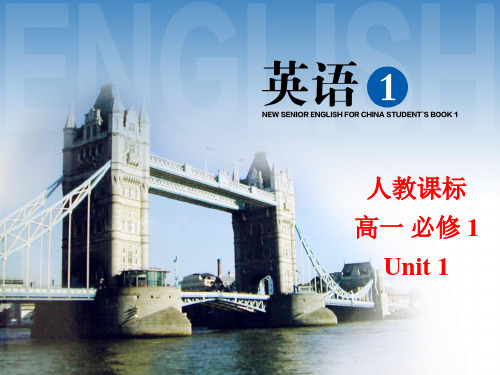
…say, “ .”
…said that+clasue
…say to sb , “ .” …tell sb.that+clasue
人称的变化
直接引语里的人称,变间接引语时,人称 要做相应调整,与汉语习惯相似.
1. He said, “I like it very much.” He said that he liked it very much.
He asked, “When do you harvest the wheat?”
He asked when you harvest the wheat. we harvested
They asked when we harvested the wheat.
特殊疑问句
•直接引语是特殊疑问句,变为间接引语时, 用原来的特殊疑问词引导, 并变为陈述语序.
过去完成时 Jack said Rick had been ill for many days till he died.
一般现在时 现在完成时 现在进行时 一般将来时 一般过去时 过去完成时
一般过去时 过去完成时 过去进行时 过去将来时 过去完成时
不变
1. “It is really cold.” she said to me. She told me that it _w_a_s_ really cold.
2. “When will the plane take off?” I wondered. I wondered _w_h_e_n_ _th_e_ p_l_a_n_e_w_o_u__ld_ _ta_k__e _o_ff_.
3. “Have you seen our plane yourself?” he asked the boy. He asked the boy w__h_e_t_h_e_r h_e_ h_a_d_ _se_e_n_ _th_e_i_r_ plane _h_im__s_e_lf_.
新教材 人教版高中英语必修第一册全册各单元重点语法汇总
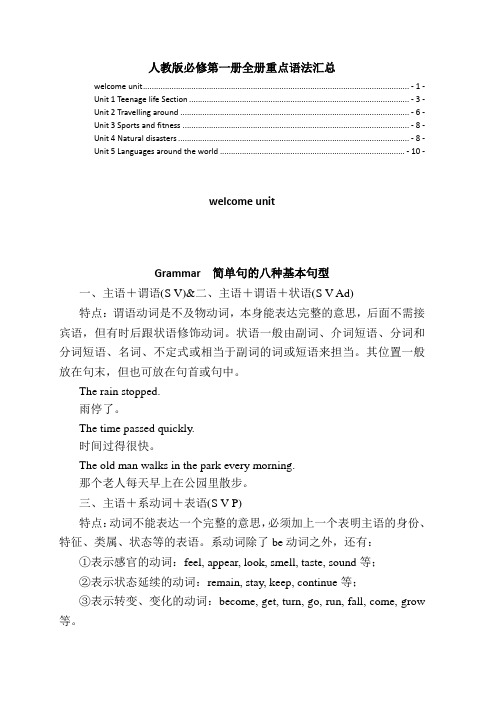
人教版必修第一册全册重点语法汇总welcome unit ......................................................................................................................... - 1 -Unit 1 Teenage life Section .................................................................................................... - 3 -Unit 2 Travelling around ........................................................................................................ - 6 -Unit 3 Sports and fitness ....................................................................................................... - 8 -Unit 4 Natural disasters ......................................................................................................... - 8 -Unit 5 Languages around the world .................................................................................... - 10 -welcome unitGrammar简单句的八种基本句型一、主语+谓语(S V)&二、主语+谓语+状语(S V Ad)特点:谓语动词是不及物动词,本身能表达完整的意思,后面不需接宾语,但有时后跟状语修饰动词。
新教材 人教版高中英语必修第一册全册各单元知识点提炼汇总(单词短语语法写作等)
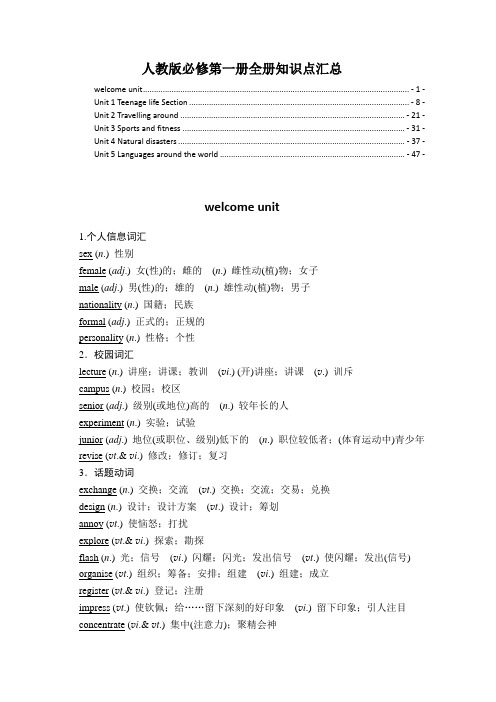
人教版必修第一册全册知识点汇总welcome unit ......................................................................................................................... - 1 - Unit 1 Teenage life Section .................................................................................................... - 8 - Unit 2 Travelling around ...................................................................................................... - 21 - Unit 3 Sports and fitness ..................................................................................................... - 31 - Unit 4 Natural disasters ....................................................................................................... - 37 - Unit 5 Languages around the world .................................................................................... - 47 -welcome unit1.个人信息词汇sex (n.) 性别female (adj.) 女(性)的;雌的(n.) 雌性动(植)物;女子male (adj.) 男(性)的;雄的(n.) 雄性动(植)物;男子nationality (n.) 国籍;民族formal (adj.) 正式的;正规的personality (n.) 性格;个性2.校园词汇lecture (n.) 讲座;讲课;教训(v i.) (开)讲座;讲课(v.) 训斥campus (n.) 校园;校区senior (adj.) 级别(或地位)高的(n.) 较年长的人experiment (n.) 实验;试验junior (adj.) 地位(或职位、级别)低下的(n.) 职位较低者;(体育运动中)青少年revise (v t.& v i.) 修改;修订;复习3.话题动词exchange (n.) 交换;交流(v t.) 交换;交流;交易;兑换design (n.) 设计;设计方案(v t.) 设计;筹划annoy (v t.) 使恼怒;打扰explore (v t.& v i.) 探索;勘探flash (n.) 光;信号(v i.) 闪耀;闪光;发出信号(v t.) 使闪耀;发出(信号) organise (v t.) 组织;筹备;安排;组建(v i.) 组建;成立register (v t.& v i.) 登记;注册impress (v t.) 使钦佩;给……留下深刻的好印象(v i.) 留下印象;引人注目concentrate (v i.& v t.) 集中(注意力);聚精会神improve (v i.& v t.) 改进;改善4.话题描述性词汇anxious (adj.) 焦虑的;不安的annoyed (adj.) 恼怒的;生气的frightened (adj.) 惊吓的;害怕的outgoing (adj.) 爱交际的;外向的awkward (adj.) 令人尴尬的;难对付的confident (adj.) 自信的;有把握的curious (adj.) 好奇的;求知欲强的forward (ad v.) (also forwards) 向前;前进(adj.) 向前的;前进的5.话题名词registration (n.) 登记;注册;挂号nation (n.) 国家;民族;国民designer (n.) 设计者impression (n.) 印象;感想confidence (n.) 信心;信任guy (n.) 小伙子;男人;家伙organisation (n.) 组织;团体;机构goal (n.) 目标;球门;射门strategy (n.) 策略;策划partner (n.) 同伴;配偶;合伙人company (n.) 公司;商行;陪伴style (n.) 方式;作风6.话题短语senior_high_school 〈美〉高中at_last 终于;最终make_an_impression 留下好印象what_if 要是……会怎么样呢concentrate_on 集中精力于leave ... alone 不打扰;不惊动junior_high_school 〈美〉初级中学look_forward_to 盼望,期待take_notes 记笔记flash_card 教学卡片;识字卡重点知识合作探究Our school invited two engineers to design_a_language_lab_for_us.我们学校邀请了两位工程师为我们设计一个语言实验室。
人教版高中英语必修一Unit1TeenageLife知识汇总大全(带答案)
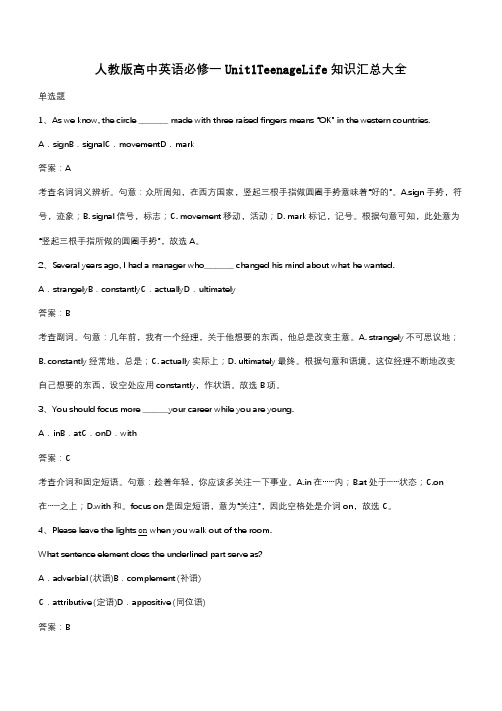
人教版高中英语必修一Unit1TeenageLife知识汇总大全单选题1、As we know, the circle ________ made with three raised fingers means “OK” in the western countries. A.signB.signalC.movementD.mark答案:A考查名词词义辨析。
句意:众所周知,在西方国家,竖起三根手指做圆圈手势意味着“好的”。
A.sign手势,符号,迹象;B. signal信号,标志;C. movement移动,活动;D. mark标记,记号。
根据句意可知,此处意为“竖起三根手指所做的圆圈手势”,故选A。
2、Several years ago, I had a manager who________ changed his mind about what he wanted. A.strangelyB.constantlyC.actuallyD.ultimately答案:B考查副词。
句意:几年前,我有一个经理,关于他想要的东西,他总是改变主意。
A. strangely不可思议地;B. constantly经常地,总是;C. actually实际上;D. ultimately最终。
根据句意和语境,这位经理不断地改变自己想要的东西,设空处应用constantly,作状语。
故选B项。
3、You should focus more _______your career while you are young.A.inB.atC.onD.with答案:C考查介词和固定短语。
句意:趁着年轻,你应该多关注一下事业。
A.in在……内;B.at处于……状态;C.on 在……之上;D.with和。
focus on是固定短语,意为“关注”,因此空格处是介词on,故选C。
4、Please leave the lights on when you walk out of the room.What sentence element does the underlined part serve as?A.adverbial (状语)B.complement (补语)C.attributive (定语)D.appositive (同位语)答案:B考查句子成分。
人教版高中英语必修一第一单元语法

注意
▪ 主从复合句的直接引语变为间接引语时, 从句中的一般过去时通常不变为过去完成 时。
人称变化
直接 引语 代词
I we you me us this these
间接
引语 he/ they I him/ them that those
代词 she
her
He said,“I like it very much.”
He said that he liked it very much.
He said to me,“I’ve left my book in your room.”
He told me that he had left his book in my room.
直接引语中的状语
状 语
now
变 ago
一般过去时 过去进行时 过去完成时 过去将来时 过去完成进行时 过去完成时
直接引语变间接引语时态不变的情况
✓当直接引语是客观真理时。
✓当直接引语中有具体的过去某年、某月、某日作状 语时。 ✓当直接引语是过去完成时态时。 ✓当主句谓语动词是一般现在时、现在完成时、一般 将来时态时。
✓当直接引语表示的是谚语或名人名言时。
✓当直接引语表示客观的时刻表时。
He said, “The earth goes around the sun.”
He said that the earth goes around the sun.
Mr. Wang said, “I was born in China in September,1972. ”
She said that she would finish her work the next day.
(完整版)人教版高中英语必修一语法知识点总结
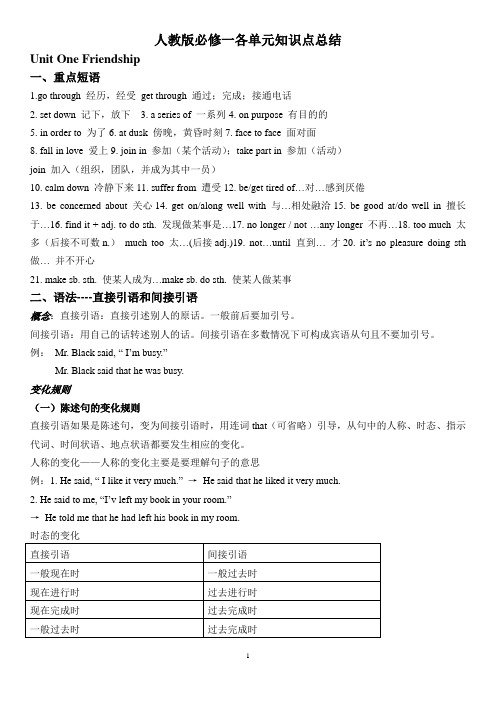
人教版必修一各单元知识点总结Unit One Friendship一、重点短语1.go through 经历,经受get through 通过;完成;接通电话2. set down 记下,放下3. a series of 一系列4. on purpose 有目的的5. in order to 为了6. at dusk 傍晚,黄昏时刻7. face to face 面对面8. fall in love 爱上9. join in 参加(某个活动);take part in 参加(活动)join 加入(组织,团队,并成为其中一员)10. calm down 冷静下来11. suffer from 遭受12. be/get tired of…对…感到厌倦13. be concerned about 关心14. get on/along well with 与…相处融洽15. be good at/do well in 擅长于…16. find it + adj. to do sth. 发现做某事是…17. no longer / not …any longer 不再…18. too much 太多(后接不可数n.)much too 太…(后接adj.)19. not…until 直到…才20. it’s no pleasure doing sth 做…并不开心21. make sb. sth. 使某人成为…make sb. do sth. 使某人做某事二、语法----直接引语和间接引语概念:直接引语:直接引述别人的原话。
一般前后要加引号。
间接引语:用自己的话转述别人的话。
间接引语在多数情况下可构成宾语从句且不要加引号。
例:Mr. Black said, “ I’m busy.”Mr. Black said that he was busy.变化规则(一)陈述句的变化规则直接引语如果是陈述句,变为间接引语时,用连词that(可省略)引导,从句中的人称、时态、指示代词、时间状语、地点状语都要发生相应的变化。
Unit 1 语法知识 名词短语,形容词短语和副词短语2023-2024学年高中英语人教版必修第一册

定语从句做后置定语
名词短语的构成
那个为所欲为的可爱女孩 the cute girl to do what she likes
不定式做后置定语
那个足够博学的可爱女孩 the cute girl wise enough
形容词短语做后置定语
Generally speaking,the more expensive the stereo , the better it is.
一般来说,立体声音响越贵越好。(作评注性状语,修饰整个句子)
高考知识点
副词短语专项
副词短语
副词短语副词短语是指由几个副词或副词及其修饰语构成 的短语。
1.由and连接的副词短语
I tried again and again.
我试了一次又一次。
2.副词 very 作修饰语与 fast 构成副词短语
He runs very fast.
他跑得非常快。
副词短语
高考知识点
名词短语专项
精讲与习题
考点
名词短语的概念 名词短语的构成 名词短语的功能
名词短语的定义
名词短语,也叫名词性短语,英文是Noun Phrase,简称NP.,是名词与他的修饰词一 起构成的短语
a good girl
名词短语的构成
a good girl
限定词
修饰词
形容词 adj
主体词 (中心词) head word
副词短语在句子中主要用作状语,修饰动词或整个句子。
Don't talk so loudly.
别这么大声说话。(作状语,修饰动词 talk)
Before long, the news spread all over the country.
高一英语必修一第一单元重点语法及知识点

高一英语必修一第一单元重点语法及知识点以下是人教版高一英语必修一第一单元重点语法及知识点:- 重点词汇和短语:- add up- upset- ignore- calm down- have got to- concern- go through- set down- a series of- on purpose- in order to- at dusk- face to face- no longer- settle- suffer- recover- get/be tired of- pack- get along with- fall in love- disagree- join in- 重点句型:- It was the first time in a year and a half that I had seen the night face to face.- I wonder if it’s because I haven’t been able to be outdoors for so long that I’ve grown so crazy about everything to do with nature.- I stayed awake on purpose until half past eleven one evening in order to have a good look at the moon for once by myself.- If you have some trouble getting along with your friends, you can write to the editor and ask for advice.- Add up your score and see how many points you can get.- What he did has added to our difficulties.- His income adds up to $1000 a month.- It' s no pleasure looking through these any longer because nature is one thing that really must be experienced.- Why is she so concerned about his attitude to her work?- The police asked him to set down what he had seen in a report.- As I was about to go out and search for him, he happened to come in.- Mr. Jones lives alone and often feels lonely.- We tried to calm him down, but he kept crying.- Does he dare (to) go out at night in such stormy weather?- He would go through fire and water for his country.- That country suffered a heavy loss in the flood.- 语法总结:- 直接引语和间接引语(一)- 直接引语:直接引述别人的原话。
- 1、下载文档前请自行甄别文档内容的完整性,平台不提供额外的编辑、内容补充、找答案等附加服务。
- 2、"仅部分预览"的文档,不可在线预览部分如存在完整性等问题,可反馈申请退款(可完整预览的文档不适用该条件!)。
- 3、如文档侵犯您的权益,请联系客服反馈,我们会尽快为您处理(人工客服工作时间:9:00-18:30)。
Grammar
Direct and Indirect Speech Ⅰ直接引语和间接引语(Ⅰ)
直接引语(direct speech):直接引用别人的话, 把它放在引号内。
间接引语(indirect speech):用自己的话转述别人的话。
1.转述他人的陈述→陈述句She said , “I’m going to Beijing.”
She said that she was going to Beijing.
2.转述他人的疑问→一般疑问句He asked, “Are you a doctor?”
He asked me if/whether I was a doctor.
3.转述他人的问题→特殊疑问句She asked, “What are you doing?”
She asked me what I was doing.
直接引语变成间接引语, 句子结构的变化
陈述句
用连词that引导, that在口语中常省略。
主句的谓语动词可直接用引语中的said, 也可用told 来代替, 注意, 可以说said that, said to sb. that, told sb. that, 不可直接说told that。
He said, “I have been to Japan.”
He said to us that he had been to Japan.
She said, “I’ll give you an exam tomorrow.”
She told us that she would give us an exam tomorrow.
陈述句解题步骤:
“I don’t like computers,”Sarah said to her friends.
Sarah said to her friends that
(I don’t like computers.)
She didn’t
Sarah said to her friends that she didn’t like computers.
一般疑问句
间接引语用连词whether或if引导, 原
主句中谓语动词said要改为asked
(me/him/us等), 语序是陈述句的语序
Tom said, “Do you have any difficulty
with English?”
Tom asked (me) whether/if I had any
difficulty with English.
He said, “You are interested in English,
aren’t you?”
He asked whether I was interested in English.
一般疑问句解题步骤:
Is it easy to improve the condition of the soil?
( They asked him )
It is easy to improve the condition of the soil.
They asked him if (it is easy to improve the condition of the soil.)
Asked is was
They asked him if it was easy to improve the condition of the soil.
特殊疑问句
原来的疑问词作为间接引语的连词, 主句的谓语动词用ask (sb.) 来表达, 语序改为陈述句语
序。
He said to me, “Where are you from?”
He asked me where I was from.
He asked us, “How many factories are
there in your country?”
He asked us how many factories there
were in our country.
特殊疑问句解题步骤:
When do you harvest the wheat?
( They asked him )
They asked him When you harvest the wheat
(you harvest the wheat.)
he
Harvested
They asked him when he harvested the wheat.
选择疑问句
用whether…or…表达(不用if/either…or…)
He asked, “Do you speak English or Chinese?”He asked me whether I spoke English or Chinese.
I asked, “Will you take a bus or on foot?”
I asked him whether he would take a bus or on foot.
谓语动词时态变化需要注意几点:
1. 直接引语表述的是客观真理, 变为间接引语时, 时态不变。
The geography teacher said, “The sun rises in the east and sets in the west.”
The geography teacher told us that the sun rises in the east and sets in the west.
2. 如果直接引语所表述的内容在目前和说话时同样有效, 变间接引语时, 时态可不变。
The children said, “We love this game.”
The children told us that they love that game.
3. 主句谓语动词的时态是现在时态, 在引述时, 时态不变。
She says, “I’ll never forget the days in the country.”
She says that she’ll never forget the days in the country.
在直接引语变为间接引语时需要注意的变化
1. 注意时态的变化
2. 注意人称和指示代词变化
3. 注意时间和地点的变化
4. 注意个别趋向动词的变化
He said he…
played football
was playing
had played
had played
would play
had played
Attention:
There are some cases in which we don’t need to change the tense in indirect speech. When direct speech is about:
a) a truth 真理
b) a timetable 时间表
c) a saying/proverb/quotation 格言/引用语
d) An adverbial indicating the past 过去的时间状语。
